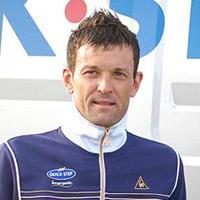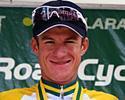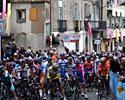
Recently on Cyclingnews.com |
News Feature, January 25, 2009
Riders fight for more power
Today's professional cyclists face increased demands and fewer well-paid job opportunities, but are struggling to assert their rights in an increasingly diverse peloton. Cyclingnews' Gregor Brown explores the options riders have to express their power in today's cycling world.
 |
For the past 10 years cyclists have faced an image problem due to doping, and it is making the lives of every professional more difficult. The public perception that most cyclists are cheats due to a few high-profile cases compounded with a bad financial market has caused sponsors to decrease their contribution or pull out entirely.
The sport has fought back with forceful, public efforts by the UCI, the teams and other anti-doping agencies to ensure riders are competing in a fair manner, but the brunt of the burden for this campaign is on the backs of the riders.
The riders face increased out-of-competition testing and anti-doping obligations while at the same time they are riding for less money or, worse yet, are out of a job. They seem to be in one of the poorest bargaining positions in the history of cycling, but there are efforts being made to put more power into the hands of the athletes who make the sport happen.
While other sports have been unionized for years, cycling's attempt at building a common voice began following the 1998 Festina Affair. The Association of Italian professionals (ACCPI) called a meeting at the 1999 Giro d'Italia and the Association of Professional Cyclists, or CPA, was born with ex-professional Francesco Moser as its president.
The Association of Professional Cyclists
Over the past 10 years the CPA has slowly built its presence, and recently gained new momentum with the election of ex-professional Cédric Vasseur as president in October 2007. The Frenchman, newly retired, related to the new problems that faced the cycling world.
"The riders want their piece of the cake."- Cedric Vasseur refers to the riders' sentiments regarding TV revenue. |
"I really think that the riders are starting to realise they have an association that's become very powerful," Vasseur said to Cyclingnews. "They are concerned about what their team managers will say, or the race organisers or the UCI [International Cycling Union - ed.]. This year, the riders – with the CPA – have realised they have a lot of power in their hands."
Vasseur's first call to arms came early in his tenure as president in the months leading up to the 2008 Tour de France. There was talk amongst race organisers and the UCI of banning the race radios which directeurs use to communicate with riders during the Tour. Vasseur, who communicates with all ProTour and Professional Continental riders – first and second division – via e-mail, conducted polls before the Tour de France to hear what the riders had to say about banning earpieces in the race. Come July, the riders had had their say and the radios were in place.
His second victory came when he finally managed to secured all of the 2007 Tour de France prize money one year after the race was over. The organisers had held up payments due to multiple doping cases. It may have been late, but the money due might not have been paid without the cyclists having some help from the CPA.
The communication isn't just one-way, and while Vasseur helps riders have their say with the UCI, the governing body also uses the CPA to spread the word of specific changes to the riders.
The latest campaign which Vasseur is taking up with the UCI and race organisers hinges on two key issues: the use of riders' images and the new "World Calendar".
"The riders no longer want to be used and broadcast in a race on TV without getting any money. They would like that the CPA acts and opens discussions with the race organiser to have some of the money. When a rider is on TV for three weeks he does not get any of that broadcast money. The riders want their piece of the cake."
Vasseur is also in discussions with the UCI to ensure that there is value to the new world calendar leader's jersey. He wants to ensure prize money for the new classification, awarded to the rider with the most points in the 2009 calendar of Historical and ProTour races.
Riders' agents
 |
Riders can also increase their leverage with the assistance from a personal agent. The agents most often come into action during contract negotiations with teams, but they can be helpful for many other situations.
"We help the riders to negotiate the contract, but we also look at the legal and tax parts [of the contract], social security, insurance, if there are any problems with the visa. We are even helping Hayden Roulston [of team Cervélo Test Team] look for a place to stay," said Paul De Geyter of Celio Sport & Image.
De Geyter represents riders like Tom Boonen, Stijn Devolder and Michael Rogers, and also cyclo-cross riders, football players and boxers.
The Belgian pointed out that the UCI is making headway to improve the protection of its riders and his clients. He said there are still improvements that the sport needs to make.
"It is clear that football players are better protected than cyclists. They have a longer tradition of contract negotiations and they also represent a bigger financial value for a team, and so it takes on greater importance."
"Normally, they have contracts from three to five years. ... [In cycling] you can sign a contract for one year or two years. We have done three year contracts, but it is more the exception than the rule."
De Geyter pointed out that there are transfer sums in football similar to buy-out clauses in a rider's contracts. These transfer sums are when a player wants to end a contract early. They follow a regulated formula depending on the number of years of experience.
"If a player has been with the club for there years it is tripled, or if he goes to a foreign team it is more money. In theory, it is the compensation for breaking over the contract. ... The [previous] team is compensated for breaking open the contract."
An agent from the Celio Sport & Image firm will take five percent of the negotiated contract, the same as for their football clients. Vasseur warned that most riders don't have an agent or they have an agent that doesn't merit his fee. The lack of an agent puts riders in a weak position when negotiating contracts.
The Association of Professional Cyclists has asked for the International Cycling Union to supply a list of accredited agents a new cyclist could refer to. This would help new professionals falling victim to incompetent or criminally intent agents.
An international peloton
 |
The presence of associations and agents to represent riders adds power that was not there more than 15 years ago. In the past, cyclists would look to one rider – like Bernard Hinault in the 1980s – to act as a voice. It worked but it may not have equally represented every rider in the peloton.
"Hinault could decide a race was not possible due to snow, there were really strong personalities. Today, there are not the same personalities and the riders have to form a union," said Vasseur.
Maurizio Fondriest, 1988 World Champion and professional from 1987 to 1998, argued that the globalisation complicates the unity amongst the modern peloton.
"Now there are many more nations that are represented, before it was easier to come to agreement amongst the cyclist," said Fondriest. "In France there were just two big stars, two in Italy... so it could be more controlled. There were more possibilities for us."
Fondriest pointed to this the 2008 Giro d'Italia as an example. The riders and teams voiced their concerns of long transfers and dangerous stage finishes.
"The riders were angry and wanted to strike. I asked, 'Why strike? You know the Giro d'Italia [route] two or there months in advance.' If they knew that the race was not appropriate – long transfers or dangerous arrivals – the riders' association has to say something in the previous months. Have meetings with the organisers or the teams."
The Italian said that riders need an association, like the CPA, to form unity. "The security of the riders is good for the riders, the teams and, in the end, for the organisers."
Fondriest noted also that the current problems with doping means the riders have come under greater scrutiny, but that there is not any other choice. He said that doping cases of 2008 necessitate that, though "it's absurd," the riders have be under tighter controls and a system of whereabouts.
"The situation was not like this in the past. ... There is not a unity amongst the cyclists."
Fondriest's comments on changes in the peloton over the last years and the problems that now face cyclists underline the need of an organised structure to empower riders from USA to Ukraine. If the riders' strength is to grow over the next 15 years it will have to be as a well-represented whole.
Photography
For a thumbnail gallery of these images, click here
Images by Bjorn Haake/Cyclingnews.com
Images by CJ Farquharson/WomensCycling.net
- Michael Rogers (Columbia) is one of the riders using Paul De Geyter as an agent.
Images by Roberto Bettini/www.bettiniphoto.net
See also:
ProTour 2011: AIGCP president raises questions.
McQuaid warns of rival international federation.
Eric Boyer: in the line of fire.
